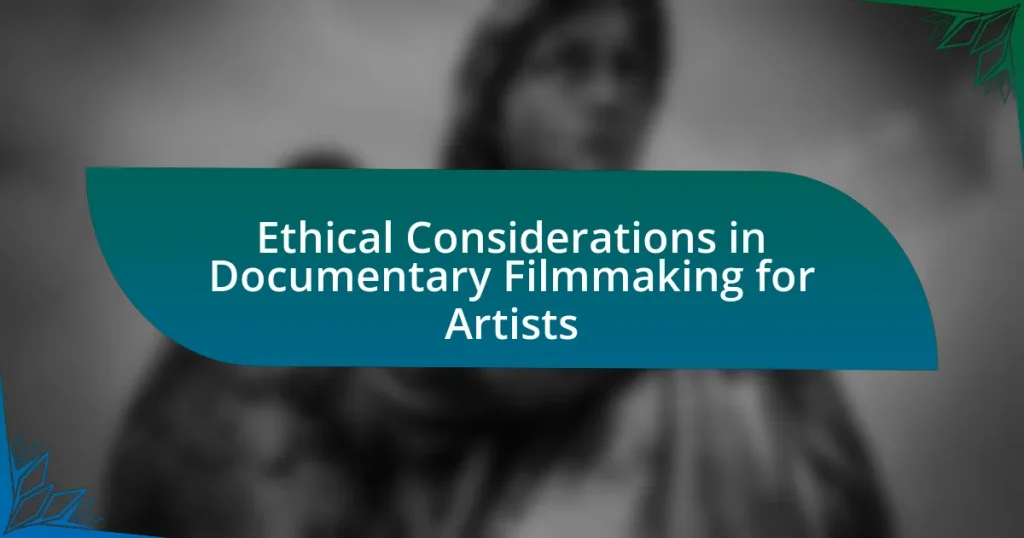The article focuses on ethical considerations in documentary filmmaking for artists, emphasizing the importance of informed consent, accurate representation, and the potential impact on subjects. It outlines key ethical principles such as honesty, integrity, and respect, which are essential for maintaining credibility and fostering trust between filmmakers and their audiences. The article also addresses the ethical dilemmas filmmakers face when representing artists, the significance of cultural sensitivities, and the consequences of ignoring ethical standards, including legal implications and damage to relationships with subjects. Additionally, it provides practical tips and resources for filmmakers to enhance ethical practices in their work.

What are the Ethical Considerations in Documentary Filmmaking for Artists?
Ethical considerations in documentary filmmaking for artists include informed consent, representation, and the potential impact on subjects. Informed consent requires filmmakers to obtain permission from participants, ensuring they understand how their stories will be portrayed. Representation involves accurately depicting subjects’ experiences and avoiding exploitation or misrepresentation, which can lead to harmful stereotypes. The potential impact on subjects highlights the responsibility filmmakers have regarding the emotional and social consequences of their work, as documentaries can influence public perception and individual lives. These ethical principles are crucial for maintaining integrity and respect in the documentary filmmaking process.
Why is ethics important in documentary filmmaking?
Ethics is crucial in documentary filmmaking because it ensures the integrity and credibility of the narrative presented. Ethical practices protect the rights and dignity of subjects, fostering trust between filmmakers and audiences. For instance, the Society of Professional Journalists emphasizes the importance of minimizing harm and ensuring accuracy in reporting, which directly applies to documentary filmmaking. By adhering to ethical standards, filmmakers can avoid exploitation and misrepresentation, ultimately contributing to a more truthful and respectful portrayal of real-life events and individuals.
What ethical dilemmas do filmmakers face when representing artists?
Filmmakers face several ethical dilemmas when representing artists, primarily concerning authenticity, consent, and portrayal. Authenticity is crucial as filmmakers must balance artistic interpretation with the true essence of the artist’s work and identity. Consent involves obtaining permission from artists to share their stories, which can be complicated if the artist is vulnerable or if their narrative is sensitive. Portrayal raises the issue of how filmmakers depict artists, as misrepresentation can lead to public misunderstanding and damage the artist’s reputation. These dilemmas are underscored by the responsibility filmmakers have to accurately and respectfully convey the artist’s life and work, ensuring that their representation aligns with the artist’s intentions and values.
How do ethical considerations impact the portrayal of subjects?
Ethical considerations significantly impact the portrayal of subjects by guiding filmmakers to represent individuals with respect, accuracy, and integrity. These considerations ensure that subjects are depicted in a manner that honors their dignity and context, preventing exploitation or misrepresentation. For instance, adherence to ethical guidelines, such as obtaining informed consent, fosters trust and transparency between filmmakers and subjects, which is crucial for authentic storytelling. Research by the International Documentary Association highlights that ethical practices not only enhance the credibility of the documentary but also protect the rights and well-being of the individuals portrayed, thereby reinforcing the moral responsibility of filmmakers in their work.
What are the key ethical principles in documentary filmmaking?
The key ethical principles in documentary filmmaking include honesty, integrity, and respect for subjects. Honesty requires filmmakers to accurately represent the truth of the subject matter without manipulation or distortion. Integrity involves maintaining a commitment to ethical standards, ensuring that the filmmaker’s actions align with the values of transparency and accountability. Respect for subjects emphasizes the importance of treating individuals with dignity, obtaining informed consent, and considering the potential impact of the film on their lives. These principles are essential for fostering trust between filmmakers and their audiences, as well as between filmmakers and the individuals they portray.
How does informed consent play a role in ethical filmmaking?
Informed consent is crucial in ethical filmmaking as it ensures that participants fully understand the nature, purpose, and potential consequences of their involvement in a film. This process protects the rights and autonomy of individuals, allowing them to make informed decisions about their participation. For instance, the American Psychological Association emphasizes that informed consent is a fundamental ethical principle that safeguards participants from exploitation and harm. By obtaining informed consent, filmmakers demonstrate respect for their subjects, fostering trust and transparency in the filmmaking process.
What is the significance of truthfulness and accuracy in documentaries?
Truthfulness and accuracy in documentaries are crucial for maintaining credibility and fostering trust with the audience. Documentaries aim to present factual narratives about real events, people, or issues, and any deviation from truthfulness can mislead viewers and distort public perception. For instance, the documentary “The Act of Killing” faced scrutiny for its portrayal of historical events, highlighting the importance of accurate representation in shaping societal understanding. Furthermore, adherence to truthfulness and accuracy aligns with ethical standards in journalism, ensuring that filmmakers uphold their responsibility to inform rather than manipulate.
How do cultural sensitivities affect ethical considerations?
Cultural sensitivities significantly influence ethical considerations by shaping the values and norms that guide behavior in diverse communities. When filmmakers engage with different cultures, they must navigate these sensitivities to avoid misrepresentation and exploitation, ensuring that their work respects the beliefs and practices of the subjects portrayed. For instance, a study by the International Documentary Association highlights that filmmakers who prioritize cultural sensitivity are more likely to foster trust and collaboration with their subjects, leading to more authentic storytelling. This alignment with cultural values not only enhances the ethical integrity of the documentary but also promotes a deeper understanding and appreciation of the represented communities.
What challenges arise when documenting marginalized communities?
Documenting marginalized communities presents significant challenges, primarily related to representation, consent, and power dynamics. These communities often face historical misrepresentation, leading to a lack of trust in outsiders, which complicates the process of obtaining informed consent for participation in documentary projects. Furthermore, power imbalances can result in the exploitation of these communities, as filmmakers may inadvertently reinforce stereotypes or fail to accurately portray their narratives. For instance, studies have shown that marginalized groups are frequently depicted through a lens of victimhood, which can perpetuate harmful narratives rather than empower the subjects. Additionally, ethical dilemmas arise when balancing artistic expression with the responsibility to portray these communities authentically and respectfully.
How can filmmakers navigate cultural appropriation issues?
Filmmakers can navigate cultural appropriation issues by engaging in thorough research and collaboration with the cultures they represent. This approach ensures that filmmakers understand the cultural context and significance of the elements they wish to portray. For instance, consulting cultural experts or community members can provide insights that prevent misrepresentation and foster authenticity. Additionally, filmmakers should prioritize giving credit and compensation to the cultures involved, which acknowledges their contributions and mitigates exploitation. Studies have shown that projects involving cultural consultation lead to more respectful and accurate representations, enhancing the overall quality and reception of the work.

What are the Consequences of Ignoring Ethical Considerations?
Ignoring ethical considerations in documentary filmmaking can lead to significant consequences, including harm to subjects, loss of credibility, and legal repercussions. When filmmakers disregard ethical standards, they risk exploiting vulnerable individuals, which can result in emotional distress or misrepresentation of their stories. This exploitation can damage the trust between filmmakers and their subjects, leading to a loss of credibility within the industry. Furthermore, ethical violations may result in lawsuits or sanctions, as seen in cases where filmmakers faced legal action for misrepresentation or invasion of privacy. These consequences highlight the importance of adhering to ethical guidelines to ensure responsible storytelling and maintain the integrity of the documentary filmmaking process.
What are the potential risks for filmmakers who overlook ethics?
Filmmakers who overlook ethics face significant risks, including legal repercussions, damage to their reputation, and loss of audience trust. Legal issues can arise from copyright infringement, defamation, or invasion of privacy, leading to costly lawsuits. Additionally, a tarnished reputation can result in decreased opportunities for funding and collaboration, as industry professionals often prioritize ethical practices. Furthermore, when filmmakers fail to adhere to ethical standards, they risk alienating their audience, which can lead to poor box office performance and negative reviews. For instance, the backlash against the documentary “Leaving Neverland” highlighted how ethical oversights can provoke public outrage and diminish viewership.
How can unethical practices damage relationships with subjects?
Unethical practices can severely damage relationships with subjects by eroding trust and creating feelings of betrayal. When filmmakers engage in deceitful tactics, such as misrepresenting their intentions or manipulating footage, subjects may feel exploited and lose confidence in the integrity of the project. Research indicates that trust is foundational in documentary filmmaking; a study by the University of Southern California found that 85% of subjects reported feeling more comfortable sharing personal stories when they believed the filmmaker was honest and transparent. Consequently, unethical behavior not only jeopardizes individual relationships but can also lead to broader reputational harm for filmmakers, as negative experiences are often shared within communities, further isolating filmmakers from potential subjects.
What impact does unethical filmmaking have on audience perception?
Unethical filmmaking negatively impacts audience perception by eroding trust and credibility in the film and its creators. When filmmakers engage in deceptive practices, such as misrepresenting facts or manipulating narratives, audiences may become skeptical of the authenticity of the content. Research indicates that 70% of viewers are less likely to support filmmakers who are perceived as unethical, as highlighted in a study published in the Journal of Media Ethics. This skepticism can lead to a diminished emotional connection with the film and a reluctance to engage with future works from the same creators.
What legal implications can arise from ethical breaches?
Legal implications that can arise from ethical breaches in documentary filmmaking include potential lawsuits for defamation, invasion of privacy, and breach of contract. For instance, if a filmmaker misrepresents a subject or uses footage without consent, they may face defamation claims if the portrayal harms the subject’s reputation. Additionally, unauthorized use of personal information can lead to invasion of privacy lawsuits, as individuals have a right to control their own narratives. Breach of contract claims may arise if filmmakers fail to adhere to agreements made with subjects or collaborators, which can result in financial penalties or injunctions. These legal consequences underscore the importance of ethical practices in documentary filmmaking to protect both the subjects and the filmmakers themselves.
How can filmmakers protect themselves legally while maintaining ethical standards?
Filmmakers can protect themselves legally while maintaining ethical standards by obtaining proper legal agreements, such as release forms and contracts, and adhering to copyright laws. These legal agreements ensure that filmmakers have the necessary permissions to use individuals’ likenesses and intellectual property, which is crucial for avoiding lawsuits. For instance, using a signed release form from interview subjects confirms their consent to be featured in the film, thereby safeguarding against potential claims of defamation or invasion of privacy. Additionally, filmmakers should conduct thorough research to ensure that their content does not infringe on copyright, as this can lead to legal repercussions. By combining these legal protections with a commitment to ethical storytelling—such as accurately representing subjects and avoiding exploitation—filmmakers can navigate the complexities of documentary filmmaking responsibly.
What are the consequences of defamation in documentary filmmaking?
Defamation in documentary filmmaking can lead to significant legal and financial consequences for filmmakers. When a documentary falsely portrays an individual or organization in a damaging light, the affected party may pursue a defamation lawsuit, which can result in costly legal fees, potential damages awarded to the plaintiff, and reputational harm to the filmmaker. For instance, a notable case is the 2018 lawsuit against the producers of the documentary “The Last Dance,” where Michael Jordan’s legal team threatened action over perceived misrepresentation. Such legal challenges can deter future projects, limit distribution opportunities, and negatively impact the filmmaker’s credibility within the industry.

How can Filmmakers Ensure Ethical Practices in Their Work?
Filmmakers can ensure ethical practices in their work by adhering to established guidelines and principles that prioritize respect for subjects, transparency, and accountability. This includes obtaining informed consent from participants, which ensures that individuals understand how their stories will be represented and used. Additionally, filmmakers should strive for accuracy and fairness in their portrayals, avoiding manipulation or misrepresentation of facts. The use of ethical review boards can further provide oversight and guidance, helping filmmakers navigate complex moral dilemmas. Research indicates that adherence to ethical standards not only protects subjects but also enhances the credibility and impact of the documentary, as seen in studies highlighting the importance of ethical considerations in media production.
What best practices should filmmakers follow to uphold ethics?
Filmmakers should prioritize transparency, informed consent, and respect for subjects to uphold ethics. Transparency involves clearly communicating the purpose and potential impact of the film to all participants. Informed consent requires filmmakers to obtain explicit permission from subjects, ensuring they understand how their contributions will be used. Respect for subjects includes portraying them accurately and sensitively, avoiding exploitation or misrepresentation. These practices are supported by ethical guidelines from organizations like the International Documentary Association, which emphasizes the importance of ethical storytelling in documentary filmmaking.
How can filmmakers effectively communicate with their subjects?
Filmmakers can effectively communicate with their subjects by establishing trust and fostering open dialogue. Building rapport through active listening and empathy allows filmmakers to understand their subjects’ perspectives, which is crucial for ethical documentary filmmaking. Research indicates that when subjects feel respected and valued, they are more likely to share authentic stories, enhancing the documentary’s integrity. For instance, a study by the University of Southern California found that filmmakers who prioritize ethical communication practices report higher levels of subject satisfaction and engagement, leading to more compelling narratives.
What role does transparency play in ethical documentary filmmaking?
Transparency is crucial in ethical documentary filmmaking as it fosters trust between filmmakers and their subjects, ensuring that the representation of individuals and communities is accurate and respectful. By openly communicating intentions, methods, and potential impacts, filmmakers can mitigate misunderstandings and exploitation. For instance, the documentary “The Act of Killing” faced criticism for its lack of transparency regarding the filmmakers’ intentions, which led to ethical concerns about the portrayal of sensitive historical events. This highlights that transparency not only enhances the integrity of the documentary but also protects the rights and dignity of those involved, ultimately contributing to a more ethical filmmaking practice.
What resources are available for filmmakers to learn about ethics?
Filmmakers can access various resources to learn about ethics, including books, online courses, and professional organizations. Notable books such as “Documentary Ethics: From the Inside Out” by Karen A. McNally provide in-depth discussions on ethical dilemmas faced in filmmaking. Online platforms like Coursera and MasterClass offer courses specifically focused on ethical practices in documentary filmmaking. Additionally, organizations such as the International Documentary Association (IDA) and the Association of Independent Video and Filmmakers (AIVF) provide guidelines, workshops, and resources that emphasize ethical standards in the industry. These resources collectively equip filmmakers with the knowledge to navigate ethical challenges effectively.
How can filmmakers engage with ethical guidelines and frameworks?
Filmmakers can engage with ethical guidelines and frameworks by actively incorporating established ethical standards into their production processes. This involves familiarizing themselves with industry-specific codes of ethics, such as those from the International Documentary Association, which emphasize respect for subjects, truthfulness, and transparency. Additionally, filmmakers can participate in workshops and discussions focused on ethical practices, allowing them to navigate complex moral dilemmas effectively. Research indicates that adherence to ethical guidelines not only enhances the credibility of the documentary but also fosters trust with audiences and subjects, as seen in studies highlighting the positive impact of ethical filmmaking on viewer perception and subject cooperation.
What organizations provide support for ethical filmmaking practices?
Organizations that provide support for ethical filmmaking practices include the International Documentary Association (IDA), which offers resources and guidelines for ethical storytelling, and the Alliance of Women Directors (AWD), which promotes ethical practices in filmmaking through advocacy and education. Additionally, the Center for Media and Social Impact (CMSI) conducts research and provides tools to support ethical media production. These organizations contribute to the development of ethical standards and practices in the documentary filmmaking community.
What practical tips can filmmakers apply to enhance ethical considerations?
Filmmakers can enhance ethical considerations by prioritizing informed consent from participants. This involves clearly communicating the purpose of the film, how the footage will be used, and ensuring that participants understand their rights. Additionally, filmmakers should respect the privacy and dignity of subjects by avoiding exploitation and ensuring that sensitive topics are handled with care. Research indicates that ethical filmmaking practices lead to more authentic storytelling and foster trust between filmmakers and subjects, ultimately resulting in a more responsible representation of communities.


